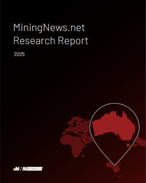This article is 11 years old. Images might not display.
Blanco is never backwards in coming forward when it comes to spruiking Latin America for Australian investment, but he has certainly shown cool-headed objectivity in a series of columns for MiningNewsPremium' sister publication, RESOURCESTOCKS.
So when he declared in ALABC's October newsletter that a recent trip to Bogota, Buenos Aires, Lima, Santiago and Sao Paulo left him with the overwhelming conclusion that "Australian companies are just too conservative and too slow in seizing the opportunities on offer", MNP felt compelled to dig further.
It is not a statement made lightly. He acknowledged to MNP that a lot of Aussie mining equipment, technology and services [METS] companies were not very large, so limited financial and human resources could limit one's ability to be in every booming market simultaneously.
However, he was unequivocal that Australian METS companies were under-represented in Latin America, even in the investment hot spots Chile, Peru and Brazil.
"There are quite a few Australian companies that should be in these markets but are not yet," he told MNP.
"There are quite a few markets on offer, and Australians tend to prefer the more stable ones - which is obvious up to a point, but you also find a lot more competition in those markets, and therefore it can be harder.
"If you're prepared to go up the risk curve - or ‘less mature' curve - a bit more, you sometimes find a wider array of opportunities that are more accessible.
"The consensus is that Chile has about 80-90 Australian METS companies in the market - a figure quoted by Austrade - which is probably double that in any other markets [in Latin America]. This can be a presence in their own right or through an alliance or joint venture with a local player. In Peru, it's about half that, and in Brazil it's probably just under half, but is growing."
While minimal Aussie presence is understandable in countries such as Colombia that, despite having improved in recent years is still well-short of achieving its considerable mining potential, or Argentina, whose policies of late have deterred and reduced foreign investment, there are no such excuses for places like Mexico.
Part of it, Blanco believes, is to do with some misconceptions that Aussie companies will only see through if they go and check it out for themselves.
This requires a level of bravado that may be a tough ask in the current economic climate, but the potential rewards are significant.
Mexico, which shot up the RESOURCESTOCKS World Risk Survey rankings from 28th in 2011 to 12th last year to 3rd this year [so is considered to have a favourable risk profile], is a case in point.
"In a market like Mexico, which has a very strong mining sector, I think Australian METS companies are significantly under-represented, and the same applies to Australian mining companies," Blanco said.
"You can quote double-digit representation by Australian juniors in Peru, Brazil and Chile, but Mexico … I don't know that there are more than 10-12 Australian companies there, yet it's a very large mining jurisdiction.
"I suspect part of the reason may be the perception that the market is too excessively dominated by the Canadians and North American METS and explorers, but the reality is that those same competitors are present in Chile and Peru. So I think Mexico should've received more attention than it has.
"Mexico has improved in recent years and its economy has stabilised, though the government is talking about changes to the mining code, with suggestions that it will introduce some higher taxes which the miners are complaining would affect their viability to continue operating there."
Austrade's Daniel Havas, Trade Commissioner in Lima, also said that Latin American resources companies are looking for lower costs and greater efficiency which could provide opportunities for Australian METS companies.
"Mining companies are focusing on increasing yields as a means of enhancing profitability amid increased competition and a reduction in commodity prices, highlighting the emphasis on productivity gains," Havas said.
Moreover, he believes Latin America's outlook for resources remains strong on the back of strong demand from China, giving Aussie companies a golden opportunity.
While Latin American miners' drive for lower costs and improved productivity is not unlike their Aussie confrere, Blanco warned that doing business there is about much more than having the right product/service at the right price.
Take Brazil, for example, which Blanco said is "a market unto itself"
"It's not one you're usually able to service from outside the market," he said.
"They don't necessarily take kindly to companies sending their Chilean-based executives to sell into Brazil. They like to see you with your presence in their market.
"Look at the [foreign] companies that are successful there: a lot of them have been in the market for quite a while and have transitioned from having expats leading their push to now having locals who they've trained and who have both local knowledge and contacts, plus a good understanding of the way the Australian companies want to operate."
The bottom line, he said, is that "these are not opportunistic markets. You're not there today because your other markets have turned down. You're there because you want to be there long-term. So the decisions you make and the structures you put in place must be with a long-term perspective"
























